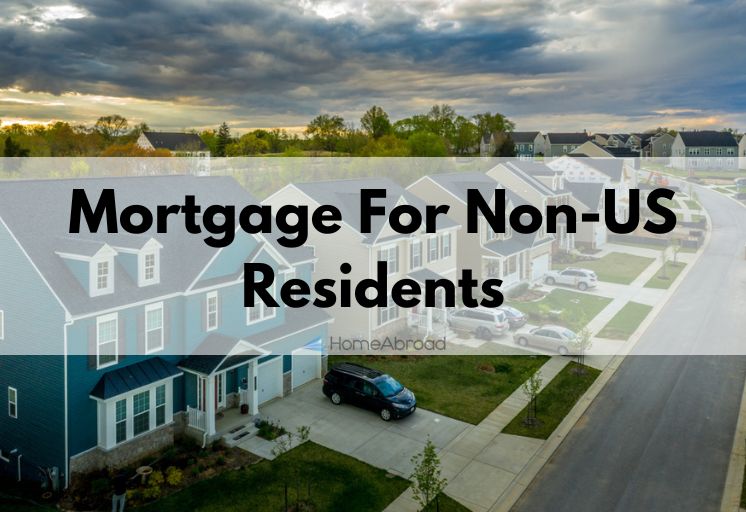
The allure of homeownership in the United States extends beyond its citizens. Many non-U.S. residents dream of owning property in this diverse and dynamic country. While the path to securing a mortgage might seem daunting for those without U.S. citizenship or residency, non-U.S. resident mortgage loans offer a viable solution. In this comprehensive guide, we’ll delve into the details of non-U.S. resident mortgage loans, their eligibility criteria, benefits, and considerations.
What Are Non-U.S. Resident Mortgage Loans?
Non-U.S. resident mortgage loans are home financing options tailored for individuals who don’t hold U.S. citizenship or permanent residency. These loans acknowledge the global nature of real estate investments and offer opportunities for non-U.S. residents to own property in the United States.
Eligibility Criteria for Non-U.S. Resident Mortgage Loans
Eligibility for non-us resident loan varies depending on the lender and the specific loan program. However, common criteria include:
Visa or Legal Status
While not all loan programs require U.S. residency, some may consider your visa status or length of legal stay in the United States.
Income Verification
Lenders typically require proof of stable income, either from sources within the United States or internationally. This demonstrates your ability to repay the loan.
Credit History
Lenders assess your credit history to evaluate your financial responsibility. A strong credit history can improve your chances of approval and favorable terms.
Down Payment
Non-U.S. residents might be required to provide a higher down payment compared to U.S. citizens or residents. This is often due to the perceived higher risk associated with non-U.S. resident loans.
Property Type
The type of property you’re purchasing can affect eligibility. Lenders might have specific criteria for different property types, such as primary residences, vacation homes, or investment properties.
Benefits of Non-U.S. Resident Mortgage Loans
Non-U.S. resident mortgage loans offer several benefits for international buyers:
Investment Opportunities
Investing in U.S. real estate can be a strategic financial move. Non-U.S. residents can take advantage of the potential appreciation and rental income opportunities.
Diversification
Owning property in the United States can provide diversification in your investment portfolio and hedge against economic fluctuations in your home country.
Establishing a Presence
For those considering future U.S. residency or business ventures, owning property can establish a physical presence and facilitate logistical arrangements.
Competitive Terms
Non-U.S. resident mortgage loans often come with competitive interest rates and terms. This makes them an attractive financing option for international buyers.
Considerations for Non-U.S. Residents
While non-U.S. resident mortgage loans offer enticing benefits, there are important considerations to keep in mind:
Lender Requirements
Lenders have varying requirements for non-U.S. resident loans. Research and connect with lenders experienced in working with international buyers to understand their specific criteria.
Currency Exchange
Consider how currency exchange rates might impact your mortgage payments, especially if your income is in a different currency.
Tax Implications
Owning property in the United States can have tax implications in both your home country and the U.S. Consult with tax professionals to understand these implications and any potential tax treaties.
Legal and Cultural Differences
Navigating real estate transactions in a foreign country involves understanding legal, cultural, and logistical differences. Working with experienced professionals can help ease this process.
Types of Non-U.S. Resident Mortgage Loans
Several types of non-U.S. resident mortgage loans cater to different buyer profiles:
Foreign National Loans
These loans are designed for non-U.S. citizens who want to purchase property in the United States. Borrowers may need to meet specific income and credit requirements.
Non-Permanent Resident Alien Loans
These loans are for individuals with legal status in the United States but who aren’t permanent residents. Visa holders and certain non-immigrant statuses might qualify.
Expatriate Loans
Expatriate loans are for U.S. citizens living and working abroad who want to purchase property in the United States. These loans accommodate the unique financial situations of expatriates.
The Application Process for Non-U.S. Resident Mortgage Loans
The process for securing a non-U.S. resident mortgage loan involves several steps:
Step 1: Research Lenders
Identify lenders who offer non-U.S. resident mortgage loans and have experience working with international buyers.
Step 2: Prequalification
Prequalify for the loan to understand your eligibility and the potential loan amount you qualify for.
Step 3: Gather Documentation
Lenders will require documentation such as proof of income, credit history, and legal residency status.
Step 4: Choose the Loan Type
Select the type of non-U.S. resident loan that aligns with your eligibility and financing needs.
Step 5: Loan Application
Submit a formal loan application to the lender of your choice.
Step 6: Property Appraisal
The lender will order a property appraisal to determine its value.
Step 7: Loan Approval
The lender reviews your application and supporting documents to approve the loan.
Step 8: Closing
Complete the necessary paperwork and pay any closing costs to finalize the loan and property purchase.
In Conclusion
Non-U.S. resident mortgage loans open doors for international buyers to invest in U.S. real estate and achieve their homeownership dreams. While navigating these loans involves considerations unique to international transactions, the benefits of owning property in the United States are compelling. If you’re a non-U.S. resident interested in purchasing property in the U.S., working with knowledgeable professionals and lenders experienced in international transactions can help you navigate the process successfully and make your real estate aspirations a reality.

